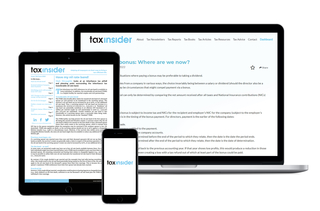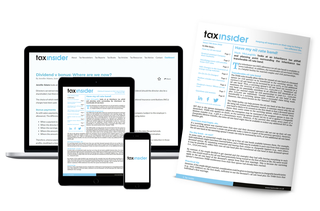New articles published
in March 2026
-
Inheritance Tax Planning: The Case for Skipping a Generation
When gifting assets, it’s sometimes beneficial to ‘skip’ a generation to avoid some tax traps for the unwary. As the UK’s ‘most hated tax’, many people are focused on avoiding inheritance tax (IHT). IHT is often viewed as voluntary because it is easy to avoid – simply give your assets away and try not to die for seven years!
Tristan Noyes examines why, when gifting assets, it can occasionally be more tax-efficient to ‘skip’ a generation and avoid potential tax pitfalls.
-
Tax Year End: Making the Most of Allowances and Reliefs
The current tax year ends on 5 April, making this a good time for individuals to review their finances and ensure that they are making the most of available tax allowances and reliefs.
The following is not an exhaustive list, but there are some practical ideas to consider before the tax year end.
Richard Curtis suggests some tax saving ideas for UK resident individuals.
-
Airbnb and VAT: Accounting After the Upper Tribunal Decision
Airbnb-type supplies of holiday accommodation are becoming increasingly popular, and property owners are putting their properties up with these types of companies and websites as well as letting them out directly themselves.
The types of property used range from small flats to large houses. In normal circumstances, the rental of residential accommodation is exempt from VAT, so no VAT is due on residential property rental. However, there are some exceptions to the VAT exemption for the rental of residential property. The supply of hotel and ‘similar accommodation’ is not exempt and is subject to VAT at the standard rate of 20%.
Andrew Needham looks at changes to the accounting for VAT in relation to Airbnb transactions following a recent Upper Tribunal decision.
-
CGT Enhancement Expenditure: What Is Actually Allowable?
HMRC regards the capital gains tax (CGT) provisions of TCGA 1992, s 38 (acquisition and disposal costs, etc.) as exhaustive. So, if an item of expenditure is within any of the categories of expenditure identified at section 38, it is allowable; if not, then it is not allowable.
Ken Moody muses over what is allowable as ‘enhancement’ expenditure for capital gains tax purposes, and encounters what seems to be a proverbial ‘Catch 22’ situation.
-
Tax Relief for Expenses: Do You Have the Evidence?
Question: What do the following statements have in common?
• My wife has been seeing aliens.
• My mother-in-law is a witch and put a curse on me.
• I fell in with the wrong crowd.Mark McLaughlin warns that a lack of supporting evidence can be fatal to a tax relief claim for expenses.
-
Travel and Subsistence: Conditions for Tax Relief
Claims for travel and subsistence costs may initially appear straightforward. However, they frequently raise complex compliance issues. This complexity largely arises from HMRC’s strict application of the statutory requirement that expenses must be incurred ‘wholly, exclusively and necessarily’ in the performance of employment duties, particularly where expenditure has both personal and professional elements.
Jennifer Adams considers the conditions that must apply when determining whether tax relief can be claimed for travel and subsistence costs.
-
Partnerships: How Are They Taxed in the UK?
A sole trader is the simplest way of operating a business with respect to tax; a partnership is another layer of complexity, albeit fairly minimal.
Chris Thorpe outlines how partnerships fit into the UK tax system.
-
Q&As with Arthur Weller
Some of our most popular articles
-
Tax implications of awarding shares to family members
The employment-related securities legislation deals with arrangements involving shares and securities provided by reason of employment where the full value of the employment reward provided to the employee is not included in the salary package and is charged to tax.
Jennifer Adams considers the tax implications of shares in a family company being awarded or gifted to family members of employees.
-
Decisions, decisions! Partnership or limited company?
A sole trader looking to expand their business might be weighing up the ‘pros’ and ‘cons’ of a partnership or a limited company. They are very different, with not only very different tax consequences, but functions as well.
Chris Thorpe looks at partnerships and companies and considers which business model might be best.
-
Don’t write off your chances of tax relief!
Under the loan relationships rules for companies, debits on loan arrangements are not deductible for corporation tax purposes in some circumstances.
Kevin Read highlights a recent case concerning the loan relationship rules for companies.
-
Who has tipped HMRC off?
When HM Revenue and Customs (HMRC) opens a tax return enquiry, the natural reaction of most taxpayers is to speculate about the reason why their tax return has been selected. In fact, HMRC does not need an excuse to open a tax return enquiry; a small proportion of tax returns are simply selected at random. .
Mark McLaughlin looks at whether a taxpayer can find out if an HMRC enquiry has been opened as the result of an accusation made by a third party.
-
Remuneration in 2024/25 - Important Considerations
When considering the tricky matter of remuneration planning, there are two things to consider; the amount of remuneration, and what form it takes.
Chris Thorpe looks at what to watch out for with regard to paying employees and directors.
-
Alternative ways of paying staff tax-efficiently
Despite the reduction in National Insurance contributions (NICs) in Spring Budget 2024, more employees are paying tax at higher rates on their earnings due to the freezing of tax thresholds. Some may find that any pay rise or bonus attracts additional tax and NICs such that the net pay increase is minimal.
Jennifer Adams looks at some alternatives to rewarding an employee with a pay rise or a bonus.
-
A popular ‘exit’ strategy when a shareholder is retiring
Mark McLaughlin looks at company purchases of own shares and warns not to become too focused on the more difficult rules for capital treatment.
A company purchase of its own shares from a shareholder is a popular ‘exit’ strategy when an individual shareholder is retiring, or a dissenting shareholder is departing.
-
Q&As with Arthur Weller
Subscription Benefits
We asked our subscribers what they love about Tax Insider.
These are the top 7 reasons that they gave us:
Monthly Newsletter
Tax Insider…





